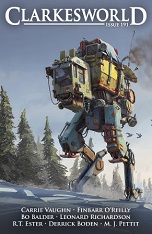 Clarkesworld #191, August 2022
Clarkesworld #191, August 2022
“Tender, Tether, Shell” by M. J. Pettit
“Pollatomish” by Finbarr O’Reilly
“Slight Forms” by R.T. Ester
“Migratory Patterns of the Modern American Skyscraper” by Derrick Boden
“The Pirate’s Consigliere” by Bo Balder
“Polly and (Not) Charles Conquer the Solar System” by Carrie Vaughn
“The Scene of the Crime” by Leonard Richardson
Reviewed by Victoria Silverwolf
This issue offers half a dozen short stories and a single novella.
In “Tender, Tether, Shell” by M. J. Pettit, an accident in space kills a human woman and destroys the shell worn by an alien, in the manner of a hermit crab. The alien discards the woman’s body and wears her spacesuit as a replacement for its shell. Another human tries to convince the alien to give up the spacesuit, because it reminds her friends of their loss. The alien explains the importance of its lost shell, and why it wants to retain the spacesuit.
This is a quiet character study, with an imaginatively created alien and gentle but powerful emotional appeal. The ending offers a subtle touch of mysticism, which manages not to be out of place in a science fiction story.
“Pollatomish” by Finbarr O’Reilly features three generations of Irish women. The eldest operates an automated factory that manufactures spaceships. Her daughter has no interest in space travel, but her granddaughter, a political activist, travels to a space colony as part of her struggle to improve conditions for the workers. A tragedy strikes, causing the grandmother to make a symbolic gesture of protest.
In addition to the very basic plot summary offered above, the story deals with several other incidents in the lives of its characters over many years. This makes the three women seem like real people. As a bonus, the author depicts the setting in evocative detail, in a way sure to appeal both to those familiar with Ireland and those who are not.
“Slight Forms” by R.T. Ester takes place at a future time when memories can be stored outside the body, able to be retrieved or destroyed at will. The protagonist also has memories of a previous life. A difficult climb up a mountain leads to an encounter with mythical beings.
If this synopsis sounds vague and disjointed, that is because the story contains many disparate elements and is often opaque. The author creates vivid scenes of mountain climbing and the protagonist’s previous life. The premise is definitely original, if sometimes confusing.
“Migratory Patterns of the Modern American Skyscraper” by Derrick Boden is a brief account of high-tech buildings, designed to house low-level workers, that suddenly change location to fit the needs of their employers. The frequent movements make life difficult for the inhabitants, until an unexpected transformation offers at least temporary relief.
The intent appears to be a satiric look at corporations and their lack of concern for those they employ. The concept is an intriguing one, developed in striking detail, but one’s reaction to the theme may depend on one’s economic and political opinions. Some readers may wish for a longer story that would explore the idea further.
The narrator of “The Pirate’s Consigliere” by Bo Balder is an advisor to the leader of a group of vicious criminals living in a spaceship. The pirates enslave those upon whom they prey, even killing them for food. They encounter a generation ship that seems easy to conquer. When the narrator enters the vessel of the intended victims, she has a change of heart about her life.
The author explains the pirates’ violent way of life through a brief mention of undescribed entities intent on wiping out all planetary life. (The concept may reminder readers of Fred Saberhagen’s relentless Berserkers, although they are only a minor background detail here.) The narrator’s sudden change of loyalty may strain credibility. In any case, this is a fast-paced, action-packed, often grim tale of battle and survival.
“Polly and (Not) Charles Conquer the Solar System” by Carrie Vaughn is the issue’s longest story. A woman serving aboard a spaceship traveling between Mars and Jupiter receives a message indicating that her twin brother, a politician on Mars, is in a hospital, seriously ill. It soon turns out that this is only a cover story for a conspiracy to prevent him from changing the system of citizenship of the Martian colony. With the help of other space explorers, she manages to locate her brother and frustrate the conspiracy.
The author writes in a very clear, readable style, making this novella seem shorter than it is. The plot never slows down, carrying the reader along with the protagonist’s adventures. The story often seems a little old-fashioned, and resembles one of Robert A. Heinlein’s so-called juvenile novels in some ways. In particular, the characters sometimes act more like adolescents than the mature adults they are supposed to be.
“The Scene of the Crime” by Leonard Richardson involves various species of aliens at an archeological dig. The investigation reveals a modern facility at the site, indicating a time loop. The explanation involves the secret motivation of the leader of the expedition, and her unexpected link with one of her students.
The story is cleverly constructed, with a classic Hitchcockian MacGuffin at the heart of the plot. (In proper style, this object is of great interest to the characters but is not explained to the reader at all.) The connection between the student and his mentor is both surprising and fairly clued. Overall, this is a work that appeals more to the intellect than the heart. Fans of traditional detective fiction are likely to enjoy it.
Victoria Silverwolf is not very familiar with Ireland.